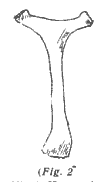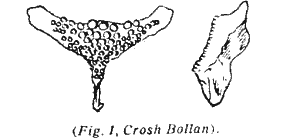[From Mannin vol II]
Folk-Lore Notes.
Two Charms.
 HESE
two charms, the Crosh Bollan (fig. 1), and Thor’s hammer (fig.
2), are of great antiquity, and the former is of particular interest
in folk-lore, as it is not confined to the Isle of Mann or even to
the "adjacent islands." This charm is the upper palate of the wrass
(a rock-fish), of which the Manx name is bollan, and from its
triangular shape is called cross, or crosh, bollan. The merit of the
Crosh Bollan is to keep the wearer of it from the power of the Little
People, and I am told also that one cannot make a mistake when
carrying it on one.
HESE
two charms, the Crosh Bollan (fig. 1), and Thor’s hammer (fig.
2), are of great antiquity, and the former is of particular interest
in folk-lore, as it is not confined to the Isle of Mann or even to
the "adjacent islands." This charm is the upper palate of the wrass
(a rock-fish), of which the Manx name is bollan, and from its
triangular shape is called cross, or crosh, bollan. The merit of the
Crosh Bollan is to keep the wearer of it from the power of the Little
People, and I am told also that one cannot make a mistake when
carrying it on one.

During the summer of 1912, Prof. Boyd
Dawkins was staying with Prof. Ridgeway, of Cambridge, who was
keenly interested in a charm that had just been sent to him from the
Aegean Islands, and which was still in use there. On seeing the
charm, Prof. Boyd Dawkins exclaimed "I can send you a duplicate of
that from the Isle of Mann!" and gave Prof. Ridgeway a crosh bollan
precisely similar to the Aegean one. It would seem that certain
charms were almost as common a symbol among widely separated peoples,
as the Fylfot.
The Thor’s hammer, is also from the mouth of an animal, being
one of the tongue bones of the sheep. Its use is to shew the right
road to take when in unknown country. Some fifteen years ago I was
driving on the Curraghs, and came to cross roads which puzzled our
driver. He exclaimed to us, "I wish I had my charm in me pockut
an’ then I could tell the wan to take." On being asked about his
charm,he explained that you throw it down on the ground, and the long
arm will point to the right road for you.
During the British Association meeting, at Belfast, In 1902, Prof.
Boyd Dawkins was shewing the identical hammer which our driver had
given him, to a number of archaeologists whilst travelling on a day
excursion among the people in the railway carriage was a working man,
who said that when he was a little boy living in the country
districts of north Lancashire, his mother always tied one of those
Thor’s hammers round his neck so that he should not lose himself
on the hills. One of the archaeologists was Prof. Haddon, who had
received that day a Thor’s hammer from Scarborough,
It would be extremely interesting to know if these two charms are
met with elsewhere. For the drawings I am indebted to the kindness of
Miss A. Mathison.
ELLA BOYD DAWKINS.
[see also Maxiana,
1870]
Douglas.
In regard to the curious note from Kirk Andreas contributed by
"Cushag" in the first number of MANNIN, it may be remarked as a
parallel, that modern Italians will not sleep with their heads
towards the bedroom door, as it indicates that if you do, so you will
be carried out head first,—i.e., as a corpse.
When I was a boy playing on Douglas shore, children called certain
small smooth stones "lucky stones." I forget if they were white
stones or flints. I mention this in order to draw further evidence.
It is worth mentioning that certain white stones were anciently
revered in Scandinavia. (See D’Alviella’s "Migration of
Symbols").
When I was a child my mother used to tell me that the howling of the wind round
the eaves of our house was the crying of the Phynodderee. What she said, not
very seriously, to me, may have been seriously told to her when she was a child.
Bonnie Moon, Simla. F. SWYNNERTON.
Peel.
The following old Manx Nursery Rhyme was recited to me by a Manxman now resident
in England, who remembered hearing his mother sing it when he lived with her
as a boy in Peel. Il do not find that it has ever been published. it is not
only pleasing in its rhythm, but the reference in it to the buggane recalls
the time when that creature was held in fear by the Marx people and adds to
the charm of the little piece. I am not, however, sure of the spelling of "swynkle
swee" nor of the significance (if any) or the words.
G. W. WOOD.
Peddyr beg swynkle swynkle,
Peddyr beg swynkle swee,
Haink y buggane rish Peddyr,
As Peddyr boght ec e vee.
Roie y buggane fo yn voard
As roie Peddyr fo yn chair;
Dooyrt y buggane rish Peddyr,
Cha jeanym rhyt veggan aggair.
Translation.
Little Peter swynkle swynkle,
Little Peter swynkle swee.
The buggane came to Peter,
And poor Peter at his meat.
The buggane ran under the table
And Peter ran under the chair ;
Said the buggane to Peter,
I'll do you no harm-so there. Lonan.
When I was a little boy my grandfather used to take
me to the old trammon trees to see the fairies' ears, and
warn me not to touch them for fear the fairies would do
us harm, for they lived in trammon trees when they were
far away from the hills.
A farmer's wife in Baldwin, who had given some
milk to a neighbour's child, called the little girl back and
put a pinch of salt in the can, saying-"There now,
that'll do, thou were just getting away, and thou might
ha' took all the luck with thee."
There had to be plenty of clean water in the crock;
the poker and tongs had to be in their places; and
meat of some sort had to be left on the table before the
fire every winter's night before going to bed, so as not to
vex the fairies.
If you happen to be on a lonely road by yourself,
and happen to hear something that's making ye afraid,
say, "Shee Yee dy :ow ma rhym," and then nothing can
harm you.
Ashburton, New Zealand, J. R. MOORE.
Prize Folk-Story.
Harry-Crab as yn Mob-beg.
Haink Mob-beg gys traie, as roie ad harrish yn genniagh fliugh er-gerrey
da oirr ny marrey. Va'd erchee dy bayrtyn ny conneyn as to mee ginsh diu
kys v'ad goll dy yannoo eh. Tra va'n tidey er hraie honnick ad shenn Harry-Crab
jesh va troailt noon as noal dy gheddyn lhongey-bee 'syn astyr. Va Harry
boght greim- mit oc as v'eh currit stiagh ayns cruick-ushtey oc. Reesht
roie ad harrish yn traie as sheese jeh ny brooghyn hie ad, choud as va
keeiragh tuittym er yn thalloo. Ghow ad fea fo'n cleigh as ghow unnane
jeu veih'n phoagey echey famman cainle. Nish ghow ad yn partan veih'n
cruick as kiangle ad thiurid jeebin er yn lurgey echey ; as tra va'n cainle
er ny foaddey oc, ghow ad as hug ad ee er yn dreeym echey, as ren adl
ee shikyr lesh yn gierr cheh. Nish v'ad cur eh ayns dorrys towl chonning,
as roie Harry ersooyl sheese y raad chew-sthie. "Ogh, hogh," va Buck-mooar
gyllagh, "Cre'n oyr shoh ! Vel jerrey yn theill eu?" "Cha nel fys aynis"
dooyrt yn partan, "agh ta'n Jouyl hene my lurg." "Roie guillyn, roie"
deie Buck-mooar, as va'd Boll ooilley fud- :,-cheilley gys dorrys, agh,
ogh, hogh ! Va jerrey yn theill ocsyn dy-firrinagh ! Hie reesht Harry-Crab,
agh cha nel dooinney erbee gra c'raad hie eh-gys yn thie ain--ny thieyn
yn Mob-beg!
|
Harry-Crab and the Mob-beg.
The boys would be comin' down to the shore in the everin', running over
the wet sands when the tide was low. It was after rabbits they were, and
I'll tell you what they were going to do. At the edge of the tide hey
saw a smart oul' Harry-Crab thravellin' back an' forrards, picking up
a meal's meat. Poor Harry was soon puck up at them, and put into an oul'
bucket they thad, an' away over the sands they came running, an' up the
face of the brooghs, an' the twilight closing down upon them. When they
had taken ress under a hedge for a bit, one of them took an end of candle
from his pocket. Then they took the partan from the bucket and tied a
length of twine to his hind-leg, and set the lighted candle on his back,
fixing it with the hot tallow. Then they set him down at the door of the
burrow, and away ran Harry down the road inside. "Ogh, hogh," yelled the
Buck-rabbit, seeing the light coming, "what's to do now! Is it the end
of the world that's in?" "I don't know, indeed," said the partan, "but
th' oul' falla himself is after me!" "Run boys, run," cried Buck-rabbit
to the rest, an' away they all ran helter-skelter for the door, but Ogh,
hogh, the end of the world it was for them in deed. Harry-Crab came back,
but the man was not sayin' which road he was taken'-to his own home---or
to the homes of the Mob-beg.
|
CUSHAG.
 HESE
two charms, the Crosh Bollan (fig. 1), and Thor’s hammer (fig.
2), are of great antiquity, and the former is of particular interest
in folk-lore, as it is not confined to the Isle of Mann or even to
the "adjacent islands." This charm is the upper palate of the wrass
(a rock-fish), of which the Manx name is bollan, and from its
triangular shape is called cross, or crosh, bollan. The merit of the
Crosh Bollan is to keep the wearer of it from the power of the Little
People, and I am told also that one cannot make a mistake when
carrying it on one.
HESE
two charms, the Crosh Bollan (fig. 1), and Thor’s hammer (fig.
2), are of great antiquity, and the former is of particular interest
in folk-lore, as it is not confined to the Isle of Mann or even to
the "adjacent islands." This charm is the upper palate of the wrass
(a rock-fish), of which the Manx name is bollan, and from its
triangular shape is called cross, or crosh, bollan. The merit of the
Crosh Bollan is to keep the wearer of it from the power of the Little
People, and I am told also that one cannot make a mistake when
carrying it on one.